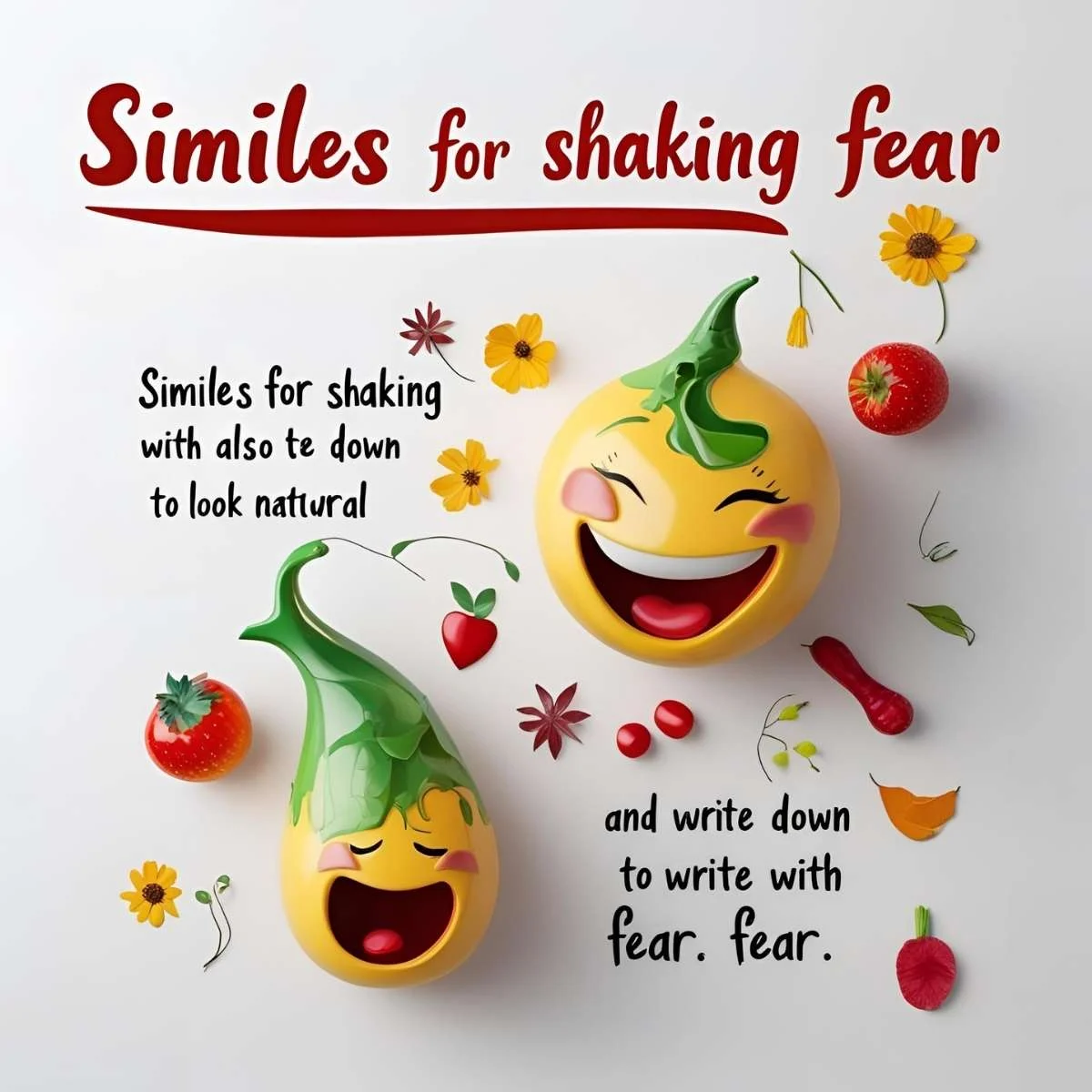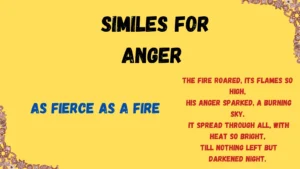The Shiver of Similes in Language ⚡️
Similes are like lightning bolts, striking with vivid comparisons using “like” or “as” to make emotions leap off the page. They transform a simple “He was scared” into “He shook like a leaf in a storm, trembling with fear.”
For moments of terror, similes capture the raw, physical jolt of fear, making stories, poems, or conversations pulse with intensity. Whether you’re writing a thriller, sharing a spooky tale, or texting about a nerve-wracking moment, these similes bring shaking with fear to life.
Ever felt your heart race at a creepy sound? Let’s explore 25 similes for shaking with fear, grouped by theme, to electrify your words! 🌩️
Similes for Shaking with Fear: 25 Vivid Comparisons
These 25 similes capture the quivering essence of fear—whether from sudden scares, creeping dread, or intense moments. Organized into thematic categories, each simile includes a meaning, a contextual example, and a specific application for writing, speaking, or storytelling. Let’s tremble through these chilling comparisons!
Shaking in Sudden Scares ⚡️
Similes for fear triggered by abrupt, startling moments.
- Fear shakes like a leaf in a storm, quivering uncontrollably.
Meaning: Fear causes rapid trembling, like a leaf battered by wind.
Example: In a horror story, “Her body shook like a leaf in a storm when the door slammed shut.”
Application: Use in a scary story or a text about a jump scare, e.g., “I shook like a leaf when the thunder hit! ⚡️” - Fear rattles like loose bolts, clattering with panic.
Meaning: Fear creates a jittery shake, like bolts vibrating in a machine.
Example: In a thriller, “His knees rattled like loose bolts as the footsteps neared.”
Application: Perfect for action scenes or a tweet about a sudden fright. - Fear trembles like a phone on vibrate, buzzing with nerves.
Meaning: Fear causes a subtle, constant quiver, like a phone’s vibration.
Example: In a teen novel, “She trembled like a phone on vibrate, waiting for the test results.”
Application: Use in a diary entry or a post about exam anxiety. - Fear quakes like a fault line, splitting with terror.
Meaning: Fear shakes violently, like an earthquake’s tremor.
Example: In a survival tale, “His body quaked like a fault line as the bear roared.”
Application: Great for adventure writing or describing a panic attack in a blog. - Fear shudders like a broken fan, wobbling with dread.
Meaning: Fear causes unsteady trembling, like a fan off-balance.
Example: In a ghost story, “She shuddered like a broken fan at the whisper in the dark.”
Application: Use in spooky narratives or a group chat about a creepy moment.
Shaking with Creeping Dread 🕸️
Similes for fear that builds slowly, like a looming threat.
- Fear ripples like water, trembling with unease.
Meaning: Fear spreads in gentle, persistent shakes, like ripples on a pond.
Example: In a mystery novel, “His hands rippled like water, sensing danger in the fog.”
Application: Use in suspense writing or a journal about growing anxiety. - Fear quivers like a tuning fork, humming with tension.
Meaning: Fear vibrates steadily, like a tuning fork’s hum.
Example: In a poem, “Her heart quivered like a tuning fork, dreading the shadowed alley.”
Application: Perfect for poetry or a caption about nervous anticipation. - Fear shakes like a candle flame, flickering with doubt.
Meaning: Fear wavers delicately, like a flame in the wind.
Example: In a quiet scene, “He shook like a candle flame, alone in the haunted house.”
Application: Use in introspective stories or a text about feeling uneasy. - Fear trembles like a spider web, fragile yet taut.
Meaning: Fear holds a delicate, tense shake, like a web under strain.
Example: In a gothic tale, “Her fingers trembled like a spider web, hearing the creak upstairs.”
Application: Great for eerie settings or a blog about phobias. - Fear jitters like a loose wire, sparking with panic.
Meaning: Fear causes erratic shaking, like a wire short-circuiting.
Example: In a sci-fi story, “His body jittered like a loose wire, facing the alien’s growl.”
Application: Use in futuristic tales or a post about a nerve-wracking moment.
Shaking with Emotional Terror 😨
Similes for fear tied to emotional or psychological stress.
- Fear shivers like a bare branch, raw and exposed.
Meaning: Fear leaves one trembling vulnerably, like a branch in winter.
Example: In a drama, “She shivered like a bare branch, confessing her secret on stage.”
Application: Use in emotional stories or a speech about vulnerability. - Fear shakes like a kite in a gale, tugged by worry.
Meaning: Fear pulls at the body, like a kite jerked by strong winds.
Example: In a memoir, “His legs shook like a kite in a gale, awaiting the doctor’s news.”
Application: Perfect for personal essays or a journal about stress. - Fear quakes like a drumskin, echoing inner turmoil.
Meaning: Fear resonates deeply, like a drumskin vibrating with each hit.
Example: In a therapy scene, “Her voice quaked like a drumskin, sharing her fears.”
Application: Use in character-driven stories or a blog about mental health. - Fear trembles like a tightrope, teetering on the edge.
Meaning: Fear balances precariously, like a tightrope walker under pressure.
Example: In a courtroom scene, “He trembled like a tightrope, facing the jury’s gaze.”
Application: Great for legal dramas or a post about public speaking nerves. - Fear shudders like a cracked mirror, fractured by dread.
Meaning: Fear breaks into jagged shakes, like a mirror splintering.
Example: In a psychological thriller, “Her body shuddered like a cracked mirror, haunted by the truth.”
Application: Use in intense narratives or a diary about self-doubt.
Shaking in Everyday Frights 😬
Similes for fear in relatable, daily scenarios.
- Fear jiggles like jelly, wobbling with nerves.
Meaning: Fear causes a soft, unsteady shake, like jelly on a plate.
Example: In a school story, “His knees jiggled like jelly before his class presentation.”
Application: Use in teen stories or a tweet about stage fright. - Fear shakes like a wet dog, shivering after a scare.
Meaning: Fear triggers a full-body tremble, like a dog shaking off water.
Example: In a comedy skit, “She shook like a wet dog after the prank jump-scare.”
Application: Perfect for humorous posts or a chat about funny scares. - Fear rattles like a tin can, clanging with anxiety.
Meaning: Fear produces a noisy, nervous shake, like a can rattling on the ground.
Example: In a job interview scene, “His hands rattled like a tin can, clutching his resume.”
Application: Use in workplace stories or a LinkedIn post about interview nerves. - Fear quivers like a rubber band, stretched to snapping.
Meaning: Fear tenses and shakes, like a rubber band pulled tight.
Example: In a parent scene, “She quivered like a rubber band, hearing her teen sneak in late.”
Application: Great for parenting blogs or a text about a tense moment. - Fear shakes like a soda can, fizzing with panic.
Meaning: Fear bubbles and trembles, like a shaken soda can.
Example: In a driving lesson, “His hands shook like a soda can, gripping the wheel.”
Application: Use in coming-of-age stories or a post about learning something scary.
Shaking with Cultural Echoes 🌍
Similes inspired by cultural or historical imagery of fear.
- Fear trembles like a temple bell, ringing with ancient dread.
Meaning: Fear resonates deeply, like a bell echoing in a sacred space.
Example: In a historical novel, “Her body trembled like a temple bell, facing the warlord’s wrath.”
Application: Use in cultural stories or a speech about historical fears. - Fear shakes like a warrior’s shield, rattling before battle.
Meaning: Fear quakes with anticipation, like a shield in a warrior’s grip.
Example: In an epic tale, “His knees shook like a warrior’s shield, awaiting the enemy’s charge.”
Application: Perfect for adventure writing or a post about facing challenges. - Fear quivers like a storyteller’s voice, trembling with ghostly tales.
Meaning: Fear shakes with eerie anticipation, like a storyteller’s voice at a campfire.
Example: In a folklore scene, “She quivered like a storyteller’s voice, hearing the forest’s wail.”
Application: Use in spooky cultural tales or a blog about storytelling. - Fear shudders like a lantern’s flame, dancing in the dark.
Meaning: Fear flickers nervously, like a lantern in a stormy night.
Example: In a cultural festival, “His hands shuddered like a lantern’s flame, fearing the ritual’s outcome.”
Application: Great for travel writing or a post about cultural events. - Fear trembles like a poet’s quill, shaking with raw emotion.
Meaning: Fear shakes with creative intensity, like a quill penning a tragic verse.
Example: In a poetry reading, “Her voice trembled like a poet’s quill, reciting her fears.”
Application: Use in literary writing or a caption for a poetry slam.
Creative Examples to Stir the Senses 🌪️
These similes make fear visceral and gripping. “Fear shakes like a wet dog” adds humor to a prank-gone-wrong scene, perfect for a lighthearted vlog. “Fear trembles like a temple bell” evokes a haunting cultural vibe, ideal for a historical saga. Ever felt your hands “jiggle like jelly” before a big moment? Try it in a text about a nerve-wracking day! Which simile captures your scariest moment—do you quake like a fault line or quiver like a tuning fork?
Try This: Pick a simile and write a sentence about a time you were scared, like “I shook like a soda can before my speech! 😬” Share it in a journal or with a friend.
Practical Applications for Every Tale 📝
These similes can electrify your communication:
- Stories: Use “fear rattles like loose bolts” in a thriller to build tension, e.g., “His body rattled like loose bolts as the shadow moved.”
- Poetry: Add “fear ripples like water” to a poem about anxiety, painting a vivid emotional image.
- Speeches: Say “We tremble like candle flames, yet face our fears” in a motivational talk about courage.
- Social Media: Post “Quivering like a rubber band before my exam! 😅” for relatable school vibes.
- Conversations: Toss “I shook like a wet dog after that scare!” into a chat for a laugh.
Challenge: Rewrite a scary moment from your life with a simile, like “I was nervous” to “I quaked like a fault line.” Notice how it amps up the drama!
Conclusion: Let Fear Inspire Your Words 🌟
Similes turn shaking with fear into a canvas for creativity. From “leaves in a storm” to “poet’s quills,” these comparisons make stories, posts, and talks pulse with emotion. Why not try one today? Weave “fear jiggles like jelly” into an essay or “fear shudders like a lantern’s flame” into a spooky tale. Better yet, craft your own simile—maybe “fear shakes like a kite in a thunderstorm.” Share it in a story, tweet, or chat, and watch fear transform into art. Your words are the spark—light up the page! 🔥



